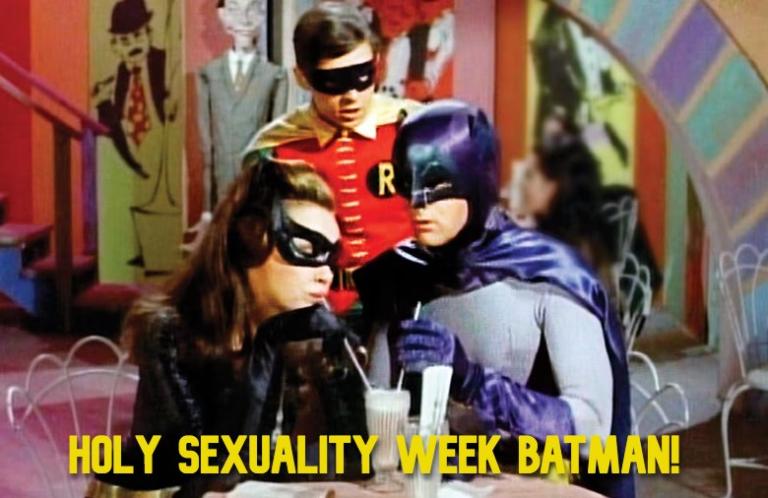News item: “Abilene Christian University to revisit sexuality policy after ‘Holy Sexuality Week.’”
Abilene Christian University is revisiting its sexuality policy after over 2,000 students, alumni and friends of the university voiced concerns about Holy Sexuality Week, a school event on relationships and sexuality some claimed included one-sided, exclusionary messages about LGBTQ people.
“You gave a public platform to people who denied the lived reality of LGBTQ+ Christians, claimed inaccurately that homosexuality lacks a genetic basis, and made the ludicrous and hateful statement that ‘the opposite of homosexuality is holiness,’” said a Nov. 16 letter written by Wildcats for Inclusion, a new alumni group formed in the wake of Holy Sexuality Week.
In an email to the group, university President Phil Schubert said the board of trustees plans to review the school’s “Sexual Stewardship Policy” in January. But in an interview with Religion News Service, Schubert said that while he can’t speak for the board, he doesn’t expect the policy to change, largely because the board dedicated extensive time to researching, praying over and developing its policy in 2017.
OK, there’s a lot to unpack here in the clash of moralities between the students who signed that letter and the administrators and donors upset by it. But before we get to that, we first have to deal with the skin-crawling horror of “Holy Sexuality Week, a school event on relationships and sexuality.”

“Sexuality Week” would be bad enough on its own. “Holy Sexuality Week” is the stuff of nightmares.
Those of you who don’t have personal life experience within the white evangelical subculture might think that the phrase “Holy Sexuality” is a little bit cringe-y, but let me assure you that for those who have lived within this subculture, that’s not the case. It’s incredibly cringe-y. Everything about this is viscerally uncomfortable, inappropriate, unreliable, and squirmy. There’s a Peter-Graves-in-Airplane! and youth-minister vibe to the whole concept (“Do you like movies about gladiators, Billy?”).
It’s dismaying to realize that there must have been, at some point, a meeting of various campus officials wherein someone piped up with the suggestion of holding a week-long event bringing in guest speakers who would all focus on “relationships and sexuality.” And then that person, or perhaps someone else in the room, added the cherry on top: “We’ll call it Holy Sexuality Week.” And somehow no one in that room put a stop to this right then and there. No one said, “No.” No one said what needed to be said, like, “That’s a terrible idea” or “I can’t imagine anyone wanting to be present for any of this or benefitting from it” or “Please, God, no, make it stop!”
That this event was conducted in earnest, sincerely, somberly, and soberly just makes it all the worse for all the same reasons as it intensifies the counter-productive awfulness of those “accountability” efforts we discussed last week.
Part of the cringe here — apart from the general ickiness of white evangelical sex talk — comes from realizing what is expected from the target audience of events like this. You will be expected to respond, which is to say to perform a response. And you will want to perform this correctly and convincingly, because failing to do so will likely prolong the discussion. If you’re a student at a place like Abilene, you’ve likely had plenty of practice at this from years of sex talks in church youth group, so you already know how to nod appropriately and what facial expression you should recreate to simulate the expected/required response. But just because you’ve gotten proficient at this performance doesn’t mean you’ll feel good about doing it.
The word “Holy” and its use here cannot be trusted. This isn’t only a problem when this word is coupled with “sexuality.” In white American Christianity, the word “holy” should generally be treated as guilty until proven innocent.
“Holy” has become a contrast word, usually employed as a qualifier to reduce or limit some otherwise unqualified Good Thing. As in “God is good, but God is also holy” or “God is love, but God is also holy” or “God is merciful, but God is also holy.” Whatever this meaning of “holy” entails, it is something evidently not wholly compatible with goodness, love, and mercy. Holiness is some thing, this usage implies, that is opposed to goodness, love, and mercy.
What does it mean, then, to strive to be a “holy person” or to live a “holy life”? It means to ensure that your life is not marked by unchecked, unqualified goodness, love, and mercy.
That’s not good.
I mean, that’s what they’re saying. I’m just agreeing. “Holy” means something other than good.
Even in its most literal meaning — “set apart” — holy is a word prone to abuse. We humans are not great at finding versions of “set apart from” that do not quickly slide into “contemptuous of.”
This is partly a problem of using the wrong preposition. “Holy” now suggests “set apart from” rather than the very different “set apart for.”
This is, again, why efforts like “Holy Sexuality Week” are doomed to be counter-productive. They propose a model of discipleship and of life that is a show about nothing. Abstinence from. “Do justice” the prophet said. “Abstain from injustice” is not the same thing, and it won’t work — not for you or for others.
All of which is to say: “Holy Sexuality Week” … Ugh. Gyaaaaaah. Shudder.
So, then, what about that letter signed by “over 2,000 students, alumni and friends of the university” and the administration’s response?
“We don’t have a neutral position on this,” Schubert said in response to concerns about one-sided messaging at the event. “We’re a faith-based institution of higher learning that is governed by a board of trustees that is deeply faith committed. And so they’ve chosen to provide some guidance on this. So I understand that some would like there to be equal representation of affirming and traditional views of marriage, but that’s not where the university sits today. And it’s not what we feel is the responsibility we have to teach and mentor students according to what we believe the Bible instructs.”
If you add up all the meager donations from the alumni who signed that letter and then weigh them up against all the donations from the trustees and other wealthy patrons, you’ll understand from that one-sided balance sheet why the school’s official policy is one-sided.
From Nov. 6-9, the school, which is affiliated with Churches of Christ, hosted a handful of speakers who addressed topics related to sex and sexuality. Ninety percent of those speaking events, Schubert said, were not focused on same-sex relationships.
Not sure how you get 90% of a handful (four and a half speakers?), but the defensive back-pedaling here is interesting.
Perhaps the most controversial speaker was Christopher Yuan, a speaker and author who has taught at Moody Bible Institute and who used to identify as gay. In his chapel session, Yuan emphasized God’s unconditional love but added that love doesn’t include unconditional approval of a person’s behavior.
“The opposite of homosexuality is holiness,” said Yuan. “In fact, the opposite of every sin struggle is holiness.”
This is delightfully absurd. “The opposite of homosexuality is holiness.” We are now invited, maybe even forced, to contemplate who or what constitutes the precise “opposite of homosexuality.” (This is a straight line — pun intended — that exceeds my capacity to do it justice. It needs to be thrown out to a large, catty panel who are all encouraged to riff on the answer for at least 20 minutes.)
Please note, though, that “holiness is a Kinsey Zero” is just one more way of saying holiness is a void and holiness is avoiding and holiness is a voiding. Which is to say that, once again, we arrive at a version of Christianity that is a show about nothing. And a life about nothing.
And a life about nothing is blasphemy and sacrilege, not holy.
In any case, my message to the students who signed that letter — and especially to the many LGBTQ students who did so — is simply this: “I would they were even cut off which trouble you.”













